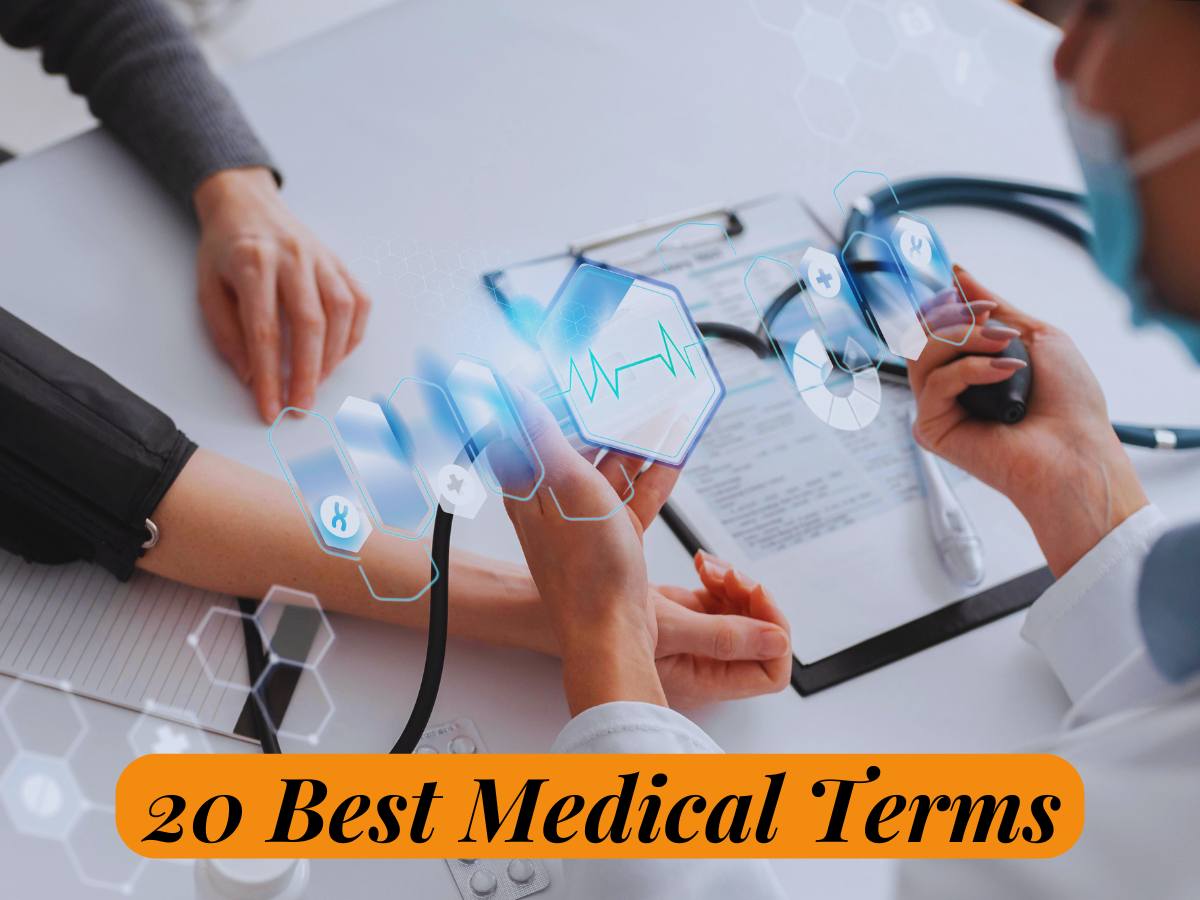The medical area is filled with technical jargon that might be intimidating to non-professionals. For patients and caregivers to communicate with healthcare providers effectively, both parties must understand medical terminology. We will go over 20 important medical terminology in this post so you may successfully explore the medical field.


20 Basic Medical Terms
1. Anatomy
Anatomy is the study of the structure of the human body.
Relevance: Understanding anatomy is important for diagnosing and treating medical conditions. It involves knowing the site of organs muscles bones and tissues and how they interrelate with each other. Medical professionals rely on structural knowledge to perform surgeries diagnose diseases and understand the physical relationships within the body.
2. Physiology
Physiology refers to the study of the functions and mechanisms in a living system.
Relevance: While anatomy emphasizes structure physiology focuses on function. It explains how organs and systems in the body work exclusively and together to maintain life. For example, physiology studies how the heart pumps blood how the lungs smooth breathing, and how the kidneys filter blood.
3. Pathology
Pathology is the study of diseases including their causes development and effects on the body.
Relevance: It analyzes tissues cells and organs to diagnose diseases. Understanding pathology is essential for identifying the cause of diseases which is essential for effective treatment. For example understanding cancer pathology helps oncologists regulate the best treatment plan.
4. Pharmacology
Pharmacology is the study of drugs and their effects on the body.
Relevance: Pharmacologists research how drugs interrelate with biological systems. This field is essential for developing new medications and understanding how existing ones work. Pharmacology helps in suggesting the right drug for the right situation knowing potential side effects and managing drug interactions.
5. Prognosis
Prognosis refers to the likely course and outcome of a disease.
Relevance: Understanding prognosis helps patients and healthcare providers make informed choices about the treatment and management of a condition. It involves predicting the duration of complications and chances of recovery or reappearance of a disease.
6. Biopsy
A biopsy is a procedure that involves taking a small sample of tissue for examination under a microscope.
Relevance: Biopsies are serious for diagnosing diseases, especially cancers. By exploring the tissue sample pathologists can determine if cells are normal or abnormal helping to confirm or instruct out a diagnosis.
7. Diagnosis
Diagnosis is the process of identifying a disease or condition from its signs and symptoms.


Relevance: It is the first step towards effective treatment. Medical professionals use a combination of patient history physical inspections and diagnostic tests to fix the cause of symptoms. Early and accurate diagnosis can significantly recover patient outcomes.
8. Chronic
Chronic refers to a condition that is long-lasting or recurrent.
Relevance: Chronic diseases such as diabetes heart disease and arthritis require ongoing organization and treatment. Understanding the chronic nature of disease helps in planning enduring care and refining the quality of life for patients.
9. Acute
Acute describes a condition that is severe and sudden in onset.
Relevance: Acute conditions such as heart attacks or appendicitis require immediate medical attention. Recognizing acute symptoms allows for rapid intervention which can be lifesaving.
10. Inflammation
Inflammation is the body’s response to injury or infection characterized by redness swelling heat and pain.
Relevance: Inflammation is a caring mechanism but chronic inflammation can lead to diseases such as rheumatoid arthritis or inflammatory bowel disease. Understanding inflammation helps in diagnosing and treating many conditions.
11. Metabolism
Metabolism refers to the chemical processes that occur within a living organism to maintain life.
Relevance: Metabolism involves converting food into energy building and repairing tissues and removing waste products. Disorders of breakdown such as diabetes or thyroid dysfunction can have important health impacts.
12. Immunity
Immunity is the body’s ability to resist infections and diseases.
Relevance: The immune system defends against harmful pathogens. Understanding immunity is important for developing vaccines treating autoimmune diseases and handling allergies.
13. Hematology
Hematology is the study of blood and blood disorders.
Relevance: Hematologists diagnose and treat conditions like anemia leukemia and clotting disorders. Blood tests are often the first step in diagnosing many diseases making hematology a vital field.
14. Neurology
Neurology is the study of the nervous system and its disorders.
Relevance: Neurologists treat conditions such as epilepsy stroke and multiple sclerosis. Understanding the nervous system is important for diagnosing and managing diseases that affect the brain spinal cord and nerves.
15. Cardiology
Cardiology is the study of the heart and its diseases.


Relevance: Cardiologists treat heart conditions such as coronary artery disease heart failure and arrhythmias. Understanding cardiology is vital for preventing and managing heart disease which is a leading cause of death worldwide.
16. Oncology
Oncology is the study and treatment of cancer.
Relevance: Oncologists diagnose and treat various types of cancer providing care that includes surgery chemotherapy and radiation therapy. Advances in oncology have significantly improved existence rates and quality of life for cancer patients.
17. Endocrinology
Endocrinology is the study of the endocrine system and hormones.
Relevance: Endocrinologists treat hormonal disorders such as diabetes thyroid diseases and adrenal disorders. Hormones regulate many physical functions so understanding endocrinology is important for maintaining overall health.
18. Gastroenterology
Gastroenterology is the study of the digestive system and its disorders.
Relevance: Gastroenterologists diagnose and treat conditions like prickly bowel syndrome Crohn’s disease and liver disease. The digestive system is important for nutrient absorption and waste elimination making this field serious for digestive health.
19. Dermatology
Dermatology is the study of skin hair and nail disorders.
Relevance: Dermatologists treat conditions like spots eczema and skin cancer. The skin is the largest organ of the body and serves as a caring barrier so maintaining its health is important.
20. Radiology
Radiology is the use of imaging techniques to diagnose and treat diseases.
Relevance: Radiologists use X-rays, MRI, CT scans, and ultrasounds to envisage the inside of the body. These imaging techniques are essential for diagnosing conditions supervisory treatments and monitoring development.
Conclusion
Understanding these 20 clinical terms gives a strong groundwork for exploring the complicated universe of medical services. Whether you are a patient medical services proficient or an understudy realizing these terms can improve your capacity to successfully pursue informed choices and better figure out the human body’s operations.
Clinical wording is the language of medication and dominating it makes the way for a more profound perception of wellbeing and infection.
Join Our Facebook Page Now:
You may also link this post:
OUR OTHER RELATED POST:





